President Joe Biden is showcasing his economic vision for the future, touting projects like Micron Technology’s chip factories that are expected to create jobs and boost American competitiveness. However, these projects have long timelines, with the first plant set to open in 2028. Biden is banking on voters believing in his vision for the economy, even as concerns about high inflation persist. Despite these challenges, Biden is optimistic about the impact his policies will have in the long term, urging voters to think about how historians will view his presidency.
In contrast, former President Donald Trump is criticizing Biden’s policies, warning that they will lead to job losses in industries like gasoline-powered autos and push work to China. Trump argues that the rising value of the dollar will harm American manufacturers by making their goods more expensive compared to foreign competitors. Trump’s messaging focuses on a return to a time when U.S. manufacturing was dominant, appealing to voters who feel nostalgic for a bygone era. He believes that Biden’s policies are misguided and will ultimately harm the country’s economic prospects.
The Biden administration played a key role in jumpstarting the Micron project by providing substantial government support. This funding will cover the construction of memory chip factories in New York and Idaho, with additional funding expected for future phases of the project. Biden’s administration has also allocated funds for renewable energy projects and other factory construction efforts, aiming to bolster the nation’s economic strength. Companies like Intel, TSMC, and Samsung are also investing in chip factories, which Biden sees as vital for driving advancements in technology and maintaining America’s economic leadership.
Despite decades of promises from politicians about a manufacturing resurgence, the reality remains that factory employment has steadily declined due to factors like automation and outsourcing. While Trump’s promises of job creation through projects like the Foxconn factories in Wisconsin fell short, Biden is hopeful that projects like the Micron chip factories will deliver on their potential. Senator Chuck Schumer believes that this time is different, pointing to the importance of technology for national security and economic growth. He envisions the United States regaining its competitive edge and creating more jobs that will help boost the economy.
The contrast between Biden and Trump’s economic messages reflects a broader debate about the future of American manufacturing and competitiveness. Biden is focused on long-term investments in technologies like AI and electric vehicles, which he believes will secure America’s position as a global economic powerhouse. Trump, on the other hand, emphasizes a return to a manufacturing-centric economy and warns against policies that he believes will harm American businesses. As both leaders gear up for future elections, their economic visions will likely be central to their campaigns as they seek to win over voters with their competing narratives about the economy and the nation’s future.


